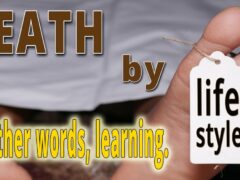Pedagogically-strategically, leading learners into confusion means we can meet them in the confusion – we can arrange to be together in the confusion. For both their learning and ours, feedback, from their experience of confusion, is the best possible source of intelligence from which to tune/improve instructional design.
Archive | Unhealthy Learning
Shame: Self-Deceiving, Self-Misperceiving, and Learning Disabling
From Science 2.0: Of 3,500 college applicants, more than a third couldn’t report their weight accurately. The heavier they were, the less accurate their estimates. “This misperception is important because the first step in dealing with a weight problem is knowing that you have one,” said Margarita Teran-Garcia, a University of Illinois professor of food science […]
Share this:
- Share on Facebook (Opens in new window) Facebook
- Share on X (Opens in new window) X
- Share on LinkedIn (Opens in new window) LinkedIn
- Share on Pinterest (Opens in new window) Pinterest
- Share on Pocket (Opens in new window) Pocket
- Share on Reddit (Opens in new window) Reddit
- Share on Telegram (Opens in new window) Telegram
- Share on Tumblr (Opens in new window) Tumblr
- Share on WhatsApp (Opens in new window) WhatsApp
- Email a link to a friend (Opens in new window) Email
- Print (Opens in new window) Print
Confused? Shame on you!
What happens to you when you become confused? How do you feel? Most of our children are growing up in environments (families, schools, peer groups…) that insidiously (mostly unintentionally but nevertheless pervasively) teach them to blame themselves for feeling confused. Children who blame themselves for feeling confused feel shame when they feel confused. Naturally, subconsciously-automatically, children […]
Share this:
- Share on Facebook (Opens in new window) Facebook
- Share on X (Opens in new window) X
- Share on LinkedIn (Opens in new window) LinkedIn
- Share on Pinterest (Opens in new window) Pinterest
- Share on Pocket (Opens in new window) Pocket
- Share on Reddit (Opens in new window) Reddit
- Share on Telegram (Opens in new window) Telegram
- Share on Tumblr (Opens in new window) Tumblr
- Share on WhatsApp (Opens in new window) WhatsApp
- Email a link to a friend (Opens in new window) Email
- Print (Opens in new window) Print
Re: Imaging study reveals differences in brain function for children with math anxiety
Re: Stanford School of Medicine – March 21, 2012 – Imaging study reveals differences in brain function for children with math anxiety This study is important reading for anyone interested in understanding the emergence of neuroscience in support of unhealthy learning, maladaptive schema, and Mind-Shame. Absent from the article are two critical distinctions: 1) Math Anxiety is a form […]
Share this:
- Share on Facebook (Opens in new window) Facebook
- Share on X (Opens in new window) X
- Share on LinkedIn (Opens in new window) LinkedIn
- Share on Pinterest (Opens in new window) Pinterest
- Share on Pocket (Opens in new window) Pocket
- Share on Reddit (Opens in new window) Reddit
- Share on Telegram (Opens in new window) Telegram
- Share on Tumblr (Opens in new window) Tumblr
- Share on WhatsApp (Opens in new window) WhatsApp
- Email a link to a friend (Opens in new window) Email
- Print (Opens in new window) Print

Other Words for Learning: Lifestyle
INTERHEART Study: Over 90% of heart attacks (myocardial infractions) can be attributed to lifestyle. America Cancer Society: There is an 82% correlation between lifestyles and cancers. Lifestyle (n.): First used in 1921 by psychologist Alfred Adler for “a person’s basic character as established early in childhood”. Since 1961 the word has broadly meant, “a way or style of living” […]
Share this:
- Share on Facebook (Opens in new window) Facebook
- Share on X (Opens in new window) X
- Share on LinkedIn (Opens in new window) LinkedIn
- Share on Pinterest (Opens in new window) Pinterest
- Share on Pocket (Opens in new window) Pocket
- Share on Reddit (Opens in new window) Reddit
- Share on Telegram (Opens in new window) Telegram
- Share on Tumblr (Opens in new window) Tumblr
- Share on WhatsApp (Opens in new window) WhatsApp
- Email a link to a friend (Opens in new window) Email
- Print (Opens in new window) Print
Re: “We only use 10% of our Brains anyway!”
The Brain Clock “Times” featured a story entitled: “We only use 10% of our Brains anyway!” The story, while dispelling the “we only use 10% of our brain” misconception, perpetuates an even more insidious one. The author traces the origin of the 10% myth back to William James who is reported to have said: “We […]
Share this:
- Share on Facebook (Opens in new window) Facebook
- Share on X (Opens in new window) X
- Share on LinkedIn (Opens in new window) LinkedIn
- Share on Pinterest (Opens in new window) Pinterest
- Share on Pocket (Opens in new window) Pocket
- Share on Reddit (Opens in new window) Reddit
- Share on Telegram (Opens in new window) Telegram
- Share on Tumblr (Opens in new window) Tumblr
- Share on WhatsApp (Opens in new window) WhatsApp
- Email a link to a friend (Opens in new window) Email
- Print (Opens in new window) Print
